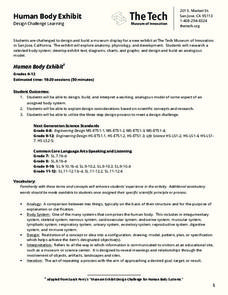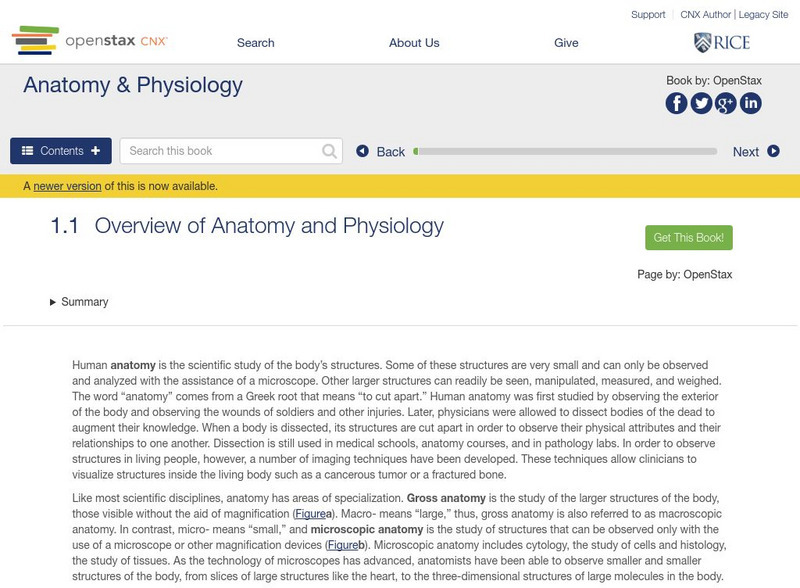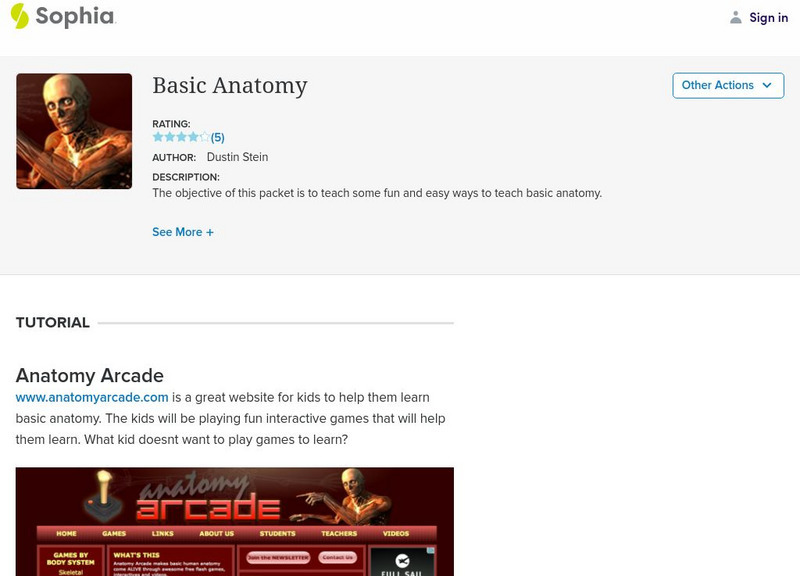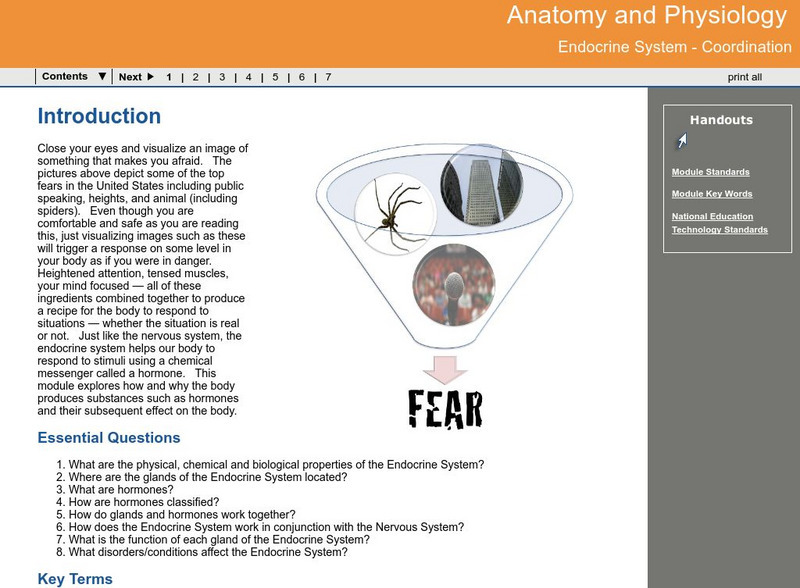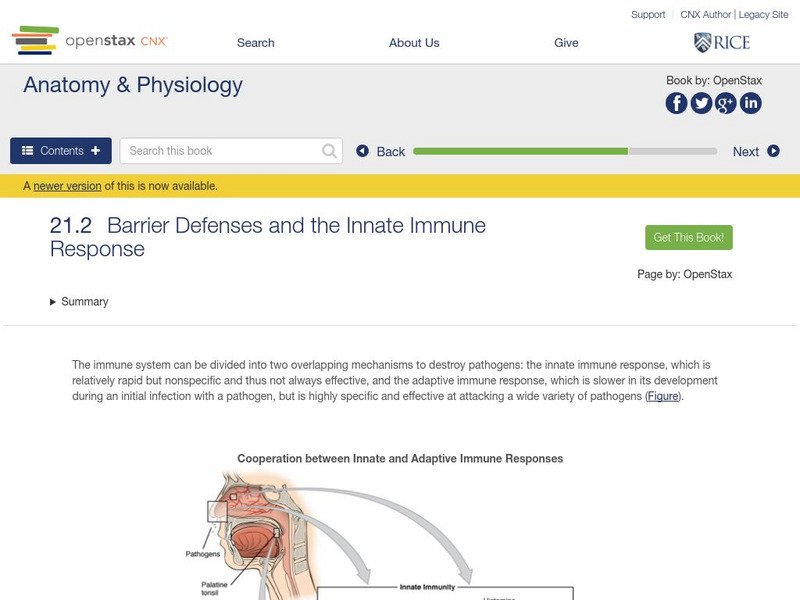Tech Museum of Innovation
Human Body Exhibit
Explore human anatomy and physiology using models. Scholars study systems of the human body and design a display for a museum exhibit. To complete the activity, individuals create analogous models of their chosen human body systems.
OpenStax
Open Stax: Overview of Human Anatomy and Physiology
This site provides an overview of human anatomy, the scientific study of the body's structures. It also includes an overview of human physiology, he scientific study of the chemistry and physics of the structures of the body and the ways...
National Cancer Institute at the National Institutes of Health
Seer Training Modules: Introduction to the Human Body
Self-guided learning activity where students learn about the functions, processes, and anatomy of the human body. There is a short quiz at the end of the lesson to check for understanding.
OpenStax
Open Stax: Structural Organization of the Human Body
Try considering the structures of the body in terms of fundamental levels of organization that increase in complexity: subatomic particles, atoms, molecules, organelles, cells, tissues, organs, organ systems, organisms and biosphere....
Sophia Learning
Sophia: Anatomy: Basic Anatomy Tutorial
Created to teach students of the 21st century, SOPHIA is bringing anatomy straight to your fingertips. Some great tips for teaching the basic parts of the body.
OpenStax
Open Stax: Functions of Human Life
The different organ systems each have different functions and therefore unique roles to perform in physiology. These many functions can be summarized in terms of a few that we might consider definitive of human life. Learn here about the...
Other
Get Body Smart: Functional Anatomy of Skeletal Muscles
Brought to you by Get Body Smart, students can learn about the human musculoskeletal system through this easy-to-access tutorial. Sections include muscles that act on the arm, shoulder, forearm, wrist, palm, digits, anterior thigh,...
Other
Get Body Smart: Human Nervous System: Anatomy and Physiology
The innovative tutorial investigates the human nervous system. Some topics explored are nerve cells, support cells, neurophysiology, brain, and spinal cord. Visual quizzes are also included.
National Cancer Institute at the National Institutes of Health
Seer Training Modules: Introduction to the Muscular System
Self-guided learning activity where students learn about the structure and function of the human muscular system. There is a short quiz at the end of the lesson to check for understanding.
National Cancer Institute at the National Institutes of Health
Seer Training Modules: Introduction to the Lymphatic System
Self-guided learning activity where students learn about the structure and function of the human lymphatic system. There is a short quiz at the end of the lesson to check for understanding.
National Cancer Institute at the National Institutes of Health
Seer Training Modules: Introduction to the Nervous System
Self-guided learning activity where students learn about the structure and function of the human nervous system. There is a short quiz at the end of the lesson to check for understanding.
National Cancer Institute at the National Institutes of Health
Seer Training Modules: Introduction to the Skeletal System
Self-guided learning activity where students learn about the structure and function of the human skeletal system. There is a short quiz at the end of the lesson to check for understanding.
National Cancer Institute at the National Institutes of Health
Seer Training Modules: Introduction to the Urinary System
Self-guided learning activity where students learn about the structure and function of the human urinary system. There is a short quiz at the end of the lesson to check for understanding.
Georgia Department of Education
Ga Virtual Learning: Anatomy and Physiology: Endocrine System
Through informational text, video clips, practice problems, and external assignments, students discover the structure and function of the endocrine system of the human body.
OpenStax
Open Stax: Requirements for Human Life
Earth and its atmosphere have provided us with air to breathe, water to drink, and food to eat, but these are not the only requirements for survival. Although you may rarely think about it, you also cannot live outside of a certain range...
Other
Get Body Smart: Respiratory System: Anatomy and Physiology
Students can learn about the human respiratory system's structures and functions through this easy-to-access tutorial. Sections include major zones and divisions, the nose and nasal cavity, the pharynx, the larynx, the trachea and...
OpenStax
Open Stax: Anatomy & Physiology: Barrier Defenses and Innate Immune Response
Students use this module to learn about the barrier defenses and the immune defense functions of the human body.
National Cancer Institute at the National Institutes of Health
Seer Training Modules: Introduction to the Reproductive System
Self-guided learning activity where students learn about the structure and function of the male and female reproductive systems. There is a short quiz at the end of the lesson to check for understanding.
OpenStax
Open Stax: Anatomy & Physiology: Skeletal System Functions
This site helps you understand the human skeletal system, a body system composed of bones and cartilage that performs critical functions for the human body.
OpenStax
Open Stax: Anatomy & Physiology: The Peripheral Nervous System
Describe the structures found in the peripheral nervous system and the functions of those parts in the human body.
OpenStax
Open Stax: Thoracic Cage
Learn here all about the thoracic cage, the part of the human anatomy that forms the thorax portion of the body.
